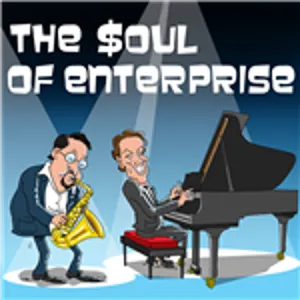Podcast Summary
Gen Z's interest in social media influencing as a career: One in four Gen Z individuals plan to become social media influencers, attracted by potential earnings and freedom from traditional employment
The influencer industry has become a serious career option for many young people, particularly from Gen Z. According to a poll, 1 in 4 Gen Z individuals plan to become social media influencers. This is a significant shift considering the term "influencer" was only added to some dictionaries in 2019. Some teenagers, like Byron Velasquez and Kaley Santiago, are considering influencing as a full-time or even side job due to the potential for earning money and popularity. Others, such as Makeda Jean Baptiste and Brian Howell, have previously considered influencing but have since decided to pursue more traditional careers. Despite the advice of career counselors to be more practical, the allure of doing what one loves without a boss is appealing to many. The influencer industry's growth and the potential it offers for young people to make a living through social media are transforming the way we view careers.
Influencer culture's transformation into a serious industry: Younger generations leverage digital platforms for self-expression, building careers, and communities as influencers, despite skepticism and pressure to find traditional employment.
Influencer culture has evolved from a casual pastime to a serious industry, particularly for younger generations who have grown up with easy access to digital platforms. As the speaker points out, influencers like Onyx, who create content on YouTube and Twitch, are no longer just goofing around. Instead, they are building careers and communities around their passions. The industry has grown significantly, with influencer agents, training courses, conferences, and networking events. For some, this creative outlet provides an alternative to traditional employment. However, not everyone understands the potential value of influencer culture, and there may be skepticism or pressure to find a "real" job. Despite this, influencer culture continues to thrive, offering a space for self-expression and creativity.
Generation Z's shift from traditional careers to passion and meaning through influencer culture: Gen Z values passion and meaning over traditional careers and can make a living through influencer culture, but it requires treating it as a business
The current generation, particularly Gen Z, values passion and meaning over traditional careers and financial stability. They see a viable path to making a living through influencer culture, but it requires treating it as a business. Leah Haberman, a social media and influencer marketing teacher, emphasizes this perspective, stating that influencers are, in fact, business owners. While it may be reassuring to families that their children can make a living through influencer culture, it's essential to understand the responsibilities that come with it. The generational divide between parents wanting their children to pursue traditional careers and their children's desire for passion and meaning is a significant shift in career expectations. This unique point in time offers opportunities for individuals to pursue their passions, but it also requires dedication, hard work, and a business mindset.
Understanding your unique value and business skills as a creator: Successful creators emphasize the importance of business skills and understanding their unique value proposition to offer value to their audience and navigate the influencer industry's challenges.
Having a backup plan is important for creators, but it's also crucial to understand why you want to be a creator and what unique value you can offer to your audience. Jaylen Baden, a successful influencer, emphasizes the importance of business skills like contract negotiation and audience research. However, the influencer industry is still new and lacks the standards and benefits of a mature industry, such as consistent rates and retirement plans. Leah Haberman from UCLA advises the next generation of influencers to recognize the hard work behind the glamour and to collectively work towards improving the industry's standards. Influencers may not have a strong voice as a collective, but by focusing on their unique value propositions and working together, they can make a significant impact.
The Future of Influencer Careers: Regulation and Evolution: As the influencer industry evolves, it could face increased regulation, including graduate schools, licensing, and special tax breaks for influencers.
The influencer career, which may seem glamorous and desirable to young people today, could potentially face challenges and become more regulated in the future. As the next generation graduates and enters the workforce, the influencer industry could evolve, possibly with graduate schools, licensing, and special tax breaks. This is based on a discussion on NPR's The Indicator podcast. The episode also touched upon the potential pitfalls influencers may encounter in their careers. The show was produced by Corey Bridges, engineered by Katherine Silver, fact checked by Dylan Sloan, and edited by Viet Layers and Kate Concannon. The Indicator is a production of NPR. Additionally, during the podcast, sponsor messages were included. Mint Mobile offered a promotional deal for unlimited wireless plans for $15 a month with a 3-month commitment. Fundrise highlighted their real estate investment opportunities, which could offer potential returns due to lower interest rates. As always, it's essential to consider the investment objectives, risks, charges, and expenses before investing.





